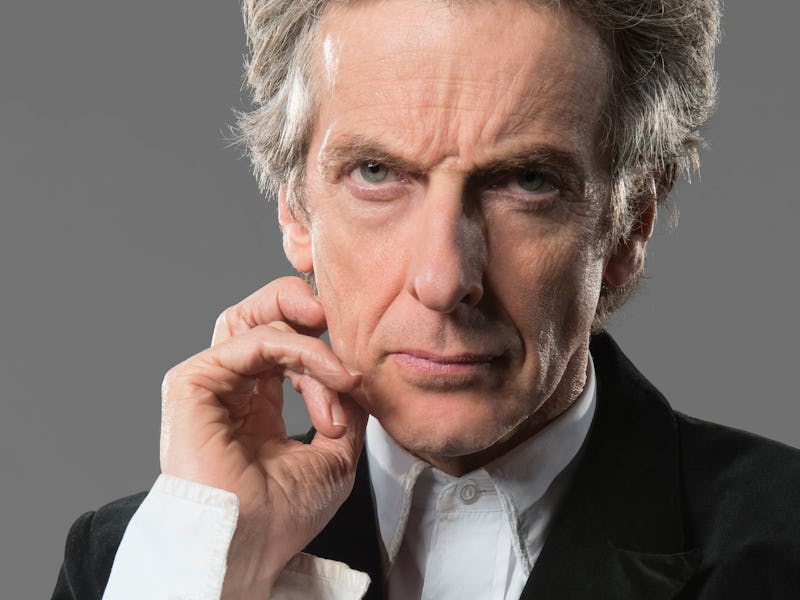Peter Capaldi, the Best 'Doctor Who,' Was Failed By His Episodes
The 12th Time Lord was doomed to repeat the past.

What is the best episode of Peter Capaldi’s tenure on Doctor Who? Overwhelmingly, fans will tell you the answer is the episode “Heaven Sent,” in which the Doctor is trapped inside a slightly meta, creeptastic castle. Tellingly, Capaldi is also the only character in “Heaven Sent”, a fact which betrays the shortcomings of his era. “Heaven Sent” is a standout because it allowed Capaldi a blank canvass against which to work, largely unburned with the show’s dizzying plots. It proved Capaldi has as just many tricks in his pocket as the titular time lord he portrays. The vast majority of his other adventures? Not so much.
As the 59 year old Scottish actor departs the role of the beloved madcap time-traveling hero, retrospectives on the Capaldi’s Doctor Who are bound to be mixed. Broadly speaking, most die hard fans consider the four seasons helmed by showrunner Russell T. Davies and starring Christopher Eccleston and then, David Tennant, were the heyday of Doctor Who story quality. The next three seasons run by Steven Moffat and starring Matt Smith were captivating enough to capture a new wave of international fans. But Capaldi’s episodes (three seasons, also overseen by Moffat) are seen as largely bad. And that’s because these stories — especially the eras helmed by Moffat — are hobbled by too much recycling.
Most of Capaldi’s episodes felt like remixes of Who’s greatest hits from the 2005 relaunch of the show. “Into the Dalek” explored the Doctor’s ruthlessness, and similarity to the Daleks, exactly like the first season Eccleston episode “Dalek.” Clara was trapped inside of a Dalek in “The Witch’s Familiar” just like she was in her first appearance as Oswin in the Smith episode “Asylum of the Daleks.” And now, Bill Potts is trapped inside a Cyberman, which already happened to one of Capaldi’s other companions, Danny Pink, who was, yep, trapped inside a Cyberman just two seasons ago!
This problem has existed since Capaldi’s first episode. Everyone loved the clockwork robots from Moffat’s season two episode “The Girl in the Fireplace.” But, by the time those same robots were rebooted for Capaldi’s debut episode, “Deep Breath,” the oomph of the concept was long gone. From Zygons to Daleks, to Davros, to River Song, Peter Capaldi has been forced to tour Doctor Who’s past, rather than explore its possible future.
Finding truly original standalone episodes of Capaldi’s era feels like a challenge. Maybe the two-dimensional aliens from “Flatline” qualify as new? But let that sink in: alien characters that are literally two-dimensional are somehow the most original.
Before the latest new season began, fans were told everything would seem new again. But, mostly, that’s just meant we’ve rediscovered the Doctor through Bill’s eyes. This trick has been partially successful, but it’s clear to an audience whose watched this cycle before that Bill — and the Doctor — are getting cheated out of the really good stuff. The Capaldi era has possibly three episodes out of three seasons which could be considered some of the best in the series. The Tennant and Smith eras have at least triple that. When ideas weren’t being recycled during the Capaldi era, throwaway episodes existed instead. When Clara was around, it was stuff like “Robots of Sherwood.” This season? Pretty everything prior to “Oxygen” has felt skippable, with the possible exception of the excellent “Thin Ice.”
But even the promise of “Oxygen,” demonstrates how Doctor Who has failed Peter Capaldi. The concept of blinding the Doctor was fantastic, and gave Capaldi something great to play with. And yet, this concept was immediately belittled by an episode that featured an ersatz Doctor living in a computer simulation, and then, hey, never mind, the Doctor has his sight back and don’t try to figure out why. The Doctor going blind was the riskiest thing the show had done in ages until it suddenly wasn’t.
And yet, through all of this, Capaldi’s performance as this weary time-travel and good-hearted character was much richer and authentic than his three predecessors. With Tennant and Smith, fans were rewarded with fun actors who were good at playing the Doctor. With Capaldi, you forget that he’s an actor. He is the Doctor. Part of this can be attributed to the fact that he’s a lifelong fan, a member of Doctor Who fanclubs since childhood. Also, his approach seemed less half-ass than previous actors. Instead of just inventing a new persona, he has said he tried to play the characters as a “mix” of all the previous Doctors. And as insane as that sounds, he’s pulled it off, ever single time.
In a way, Capaldi’s managed to give even the most mediocre run in modern Who history meaning because of this devotion to Who. By giving his rendition of the Doctor a sense that he’s been there, done that, the Doctor’s frustration connects to the audience in a visceral way. Only Capaldi’s deep appreciation and commitment to the character allows for this meta-commentary on the Doctor’s weariness and for the audience to be in on it.
Capaldi’s Doctor may be remembered as the cranky Doctor, suffering the foolishness of violence and evil all around him. Meanwhile, the fans are just as cranky, longing for this wonderfully rich character to have adventures that feel exciting, upbeat, and most of all, brand new. Because even in his best episode, — “Heaven Sent” — the Doctor was trapped in what he admitted was a “closed energy loop.” Meaning when even Capaldi’s was at the height of his powers, he was still being forced to run around in circles.